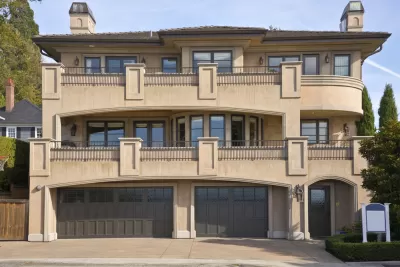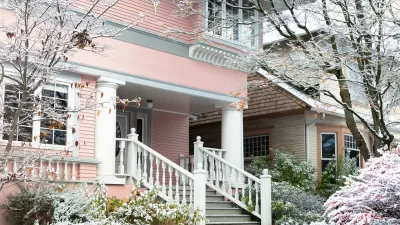Is this a two-birds-with-one-stone situation?

The Seattle City Council is considering a new ordinance that would ban the construction of large, detached single-family houses (more commonly referred to as McMansions) while also easing restrictions on accessory dwelling units (i.e., ADUs, but also commonly referred to as mother-in-law units of granny flats).
City Councilmember Mike O’Brien is championing the potentially game changing legislation, according to an article by Daniel Beekman. Mcmansions are a particularly popular building typology in Seattle these days, like in many other cities. "O’Brien’s proposed limit would have blocked almost half the new single-family houses constructed in Seattle since 2010, had it been on the books," according to Beekman.
As Beekman explains, the bill's dual purposes are the results of a political calculus intended to broker a partnership between two usually opposing forces: pro-development YIMBYs and anti-development homeowners (sometimes referred to as NIMBYs).
"O’Brien has described backyard cottages and basement apartments as a gentle way to add density as Seattle’s population grows, knowing he can count on urbanists as cheerleaders. By taking aim at McMansions, he hopes to also win support from residents grumpy about development."
According to Beekman, the proposal's less restrictive regulations of ADUs have gained more attention than the more restrictive regulations of McMansions.
As for the key matter of how the city's zoning code change would change to restrict the development of McMansions, Beekman provides the following explanation: "Under O’Brien’s legislation […] the city would adopt a maximum Floor Area Ratio (FAR) of 0.5 for new houses on most lots."
While the city considers these substantial changes to its zoning code and the types of single-family housing it will allow in the future, the Washington State Legislature recently approved legislation that would provide incentives for local governments to increase density.
FULL STORY: New ban on ‘McMansions’ would dramatically change Seattle’s house-building rules

Planetizen Federal Action Tracker
A weekly monitor of how Trump’s orders and actions are impacting planners and planning in America.

San Francisco's School District Spent $105M To Build Affordable Housing for Teachers — And That's Just the Beginning
SFUSD joins a growing list of school districts using their land holdings to address housing affordability challenges faced by their own employees.

The Tiny, Adorable $7,000 Car Turning Japan Onto EVs
The single seat Mibot charges from a regular plug as quickly as an iPad, and is about half the price of an average EV.

Seattle's Plan for Adopting Driverless Cars
Equity, safety, accessibility and affordability are front of mind as the city prepares for robotaxis and other autonomous vehicles.

As Trump Phases Out FEMA, Is It Time to Flee the Floodplains?
With less federal funding available for disaster relief efforts, the need to relocate at-risk communities is more urgent than ever.

With Protected Lanes, 460% More People Commute by Bike
For those needing more ammo, more data proving what we already knew is here.
Urban Design for Planners 1: Software Tools
This six-course series explores essential urban design concepts using open source software and equips planners with the tools they need to participate fully in the urban design process.
Planning for Universal Design
Learn the tools for implementing Universal Design in planning regulations.
Smith Gee Studio
City of Charlotte
City of Camden Redevelopment Agency
City of Astoria
Transportation Research & Education Center (TREC) at Portland State University
US High Speed Rail Association
City of Camden Redevelopment Agency
Municipality of Princeton (NJ)





























